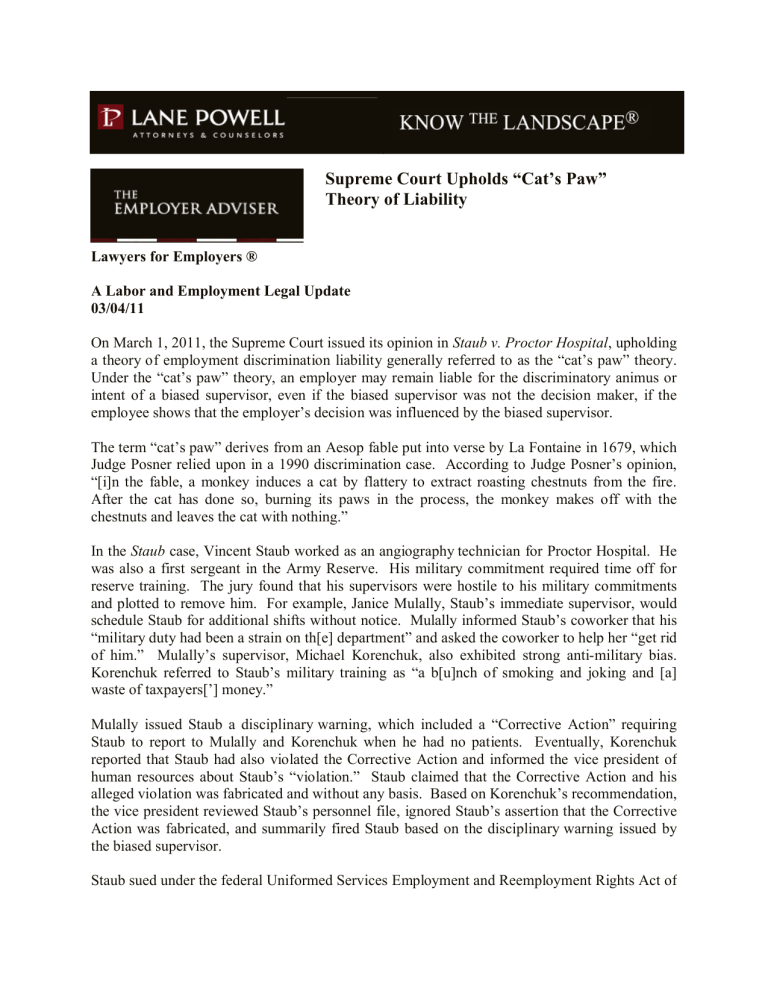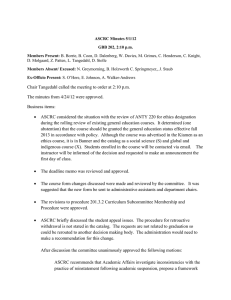Supreme Court Upholds “Cat’s Paw” Theory of Liability

Supreme Court Upholds “Cat’s Paw”
Theory of Liability
Lawyers for Employers ®
A Labor and Employment Legal Update
03/04/11
On March 1, 2011, the Supreme Court issued its opinion in Staub v. Proctor Hospital , upholding a theory of employment discrimination liability generally referred to as the “cat’s paw” theory.
Under the “cat’s paw” theory, an employer may remain liable for the discriminatory animus or intent of a biased supervisor, even if the biased supervisor was not the decision maker, if the employee shows that the employer’s decision was influenced by the biased supervisor.
The term “cat’s paw” derives from an Aesop fable put into verse by La Fontaine in 1679, which
Judge Posner relied upon in a 1990 discrimination case. According to Judge Posner’s opinion,
“[i]n the fable, a monkey induces a cat by flattery to extract roasting chestnuts from the fire.
After the cat has done so, burning its paws in the process, the monkey makes off with the chestnuts and leaves the cat with nothing.”
In the Staub case, Vincent Staub worked as an angiography technician for Proctor Hospital. He was also a first sergeant in the Army Reserve. His military commitment required time off for reserve training. The jury found that his supervisors were hostile to his military commitments and plotted to remove him. For example, Janice Mulally, Staub’s immediate supervisor, would schedule Staub for additional shifts without notice. Mulally informed Staub’s coworker that his
“military duty had been a strain on th[e] department” and asked the coworker to help her “get rid of him.” Mulally’s supervisor, Michael Korenchuk, also exhibited strong anti-military bias.
Korenchuk referred to Staub’s military training as “a b[u]nch of smoking and joking and [a] waste of taxpayers[’] money.”
Mulally issued Staub a disciplinary warning, which included a “Corrective Action” requiring
Staub to report to Mulally and Korenchuk when he had no patients. Eventually, Korenchuk reported that Staub had also violated the Corrective Action and informed the vice president of human resources about Staub’s “violation.” Staub claimed that the Corrective Action and his alleged violation was fabricated and without any basis. Based on Korenchuk’s recommendation, the vice president reviewed Staub’s personnel file, ignored Staub’s assertion that the Corrective
Action was fabricated, and summarily fired Staub based on the disciplinary warning issued by the biased supervisor.
Staub sued under the federal Uniformed Services Employment and Reemployment Rights Act of
1994 (“USERRA”). USERRA forbids an employer from denying “employment, reemployment, retention in employment, promotion, or any benefit of employment” based on “membership” in or an “obligation to perform service in a uniformed service” and provides that liability is established “if the person's membership ... is a motivating factor in the employer's action.”
The Supreme Court held that the “cat’s paw” theory would apply where: (i) a supervisor performed an act motivated by discriminatory animus; (ii) the supervisor intended to cause an adverse action against the employee; and (iii) the discriminatory act is a “proximate cause” of the ultimate employment action. The Supreme Court further held that a decision maker’s independent investigation did not necessarily insulate the ultimate employment action from any discriminatory taint. Though the decision maker may have considered other factors, the biased reports could still remain “a motivating factor” in the decision in violation of USERRA.
The Reach of the Ruling is Likely Broad
The Supreme Court made it clear that its ruling will apply more broadly. The Court noted that
Title VII is very similar to USERRA, particularly because an employee need only show that discrimination was “a motivating factor” in an adverse decision in order to prove causation.
Employers should therefore assume that the “cat’s paw” theory of liability will apply to any claim under any discrimination or anti-retaliation statute that does not require discriminatory animus or intent to retaliate to be the “sole” motivating factor.
The Supreme Court expressed no view on whether an employer would be liable where a coworker , rather than a supervisor, commits a discriminatory act influencing an ultimate employment decision. Nevertheless, employers should anticipate that Staub will be broadly applied to arguably biased non-decision makers who are not supervisors.
For employers located in Washington, Oregon and Alaska, Staub does not signal any significant change in federal law. The Ninth Circuit Court of Appeals has already ruled consistently with
Staub that a subordinate’s bias will be imputed to the employer if the plaintiff can prove that the adverse employment action was influenced by the biased subordinate.
What This Means For Employers
In light of the Supreme Court’s Staub decision, employers should continue to follow these best practices:
Ultimate decision makers should not generally rely solely upon the recommendations of subordinates in making their employment decisions;
Ultimate decision makers should conduct thorough investigations to lessen the likelihood of a court finding an inappropriate factor to be the proximate cause of an adverse employment action;
Continue to identify and eliminate discriminatory practices in the workplace;
Adopt, publicize and enforce an effective anti-discrimination and anti-retaliation policy that includes a complaint process; and
Train supervisors to comply with anti-discrimination and anti-retaliation laws, including
2
USERRA.
For more information, please contact the Labor and Employment Law Practice Groups at Lane
Powell:
206.223.7000 Seattle
503.778.2100 Portland
907.277.9511 Anchorage lanepowell@lanepowell.com
www.lanepowell.com
We provide Employer Adviser as a service to our clients, colleagues and friends. It is intended to be a source of general information, not an opinion or legal advice on any specific situation, and does not create an attorney-client relationship with our readers. If you would like more information regarding whether we may assist you in any particular matter, please contact one of our lawyers, using care not to provide us any confidential information until we have notified you in writing that there are no conflicts of interest and that we have agreed to represent you on the specific matter that is the subject of your inquiry.
Copyright © 2011 Lane Powell PC
Seattle - Portland - Anchorage - Olympia - Tacoma - London
3
